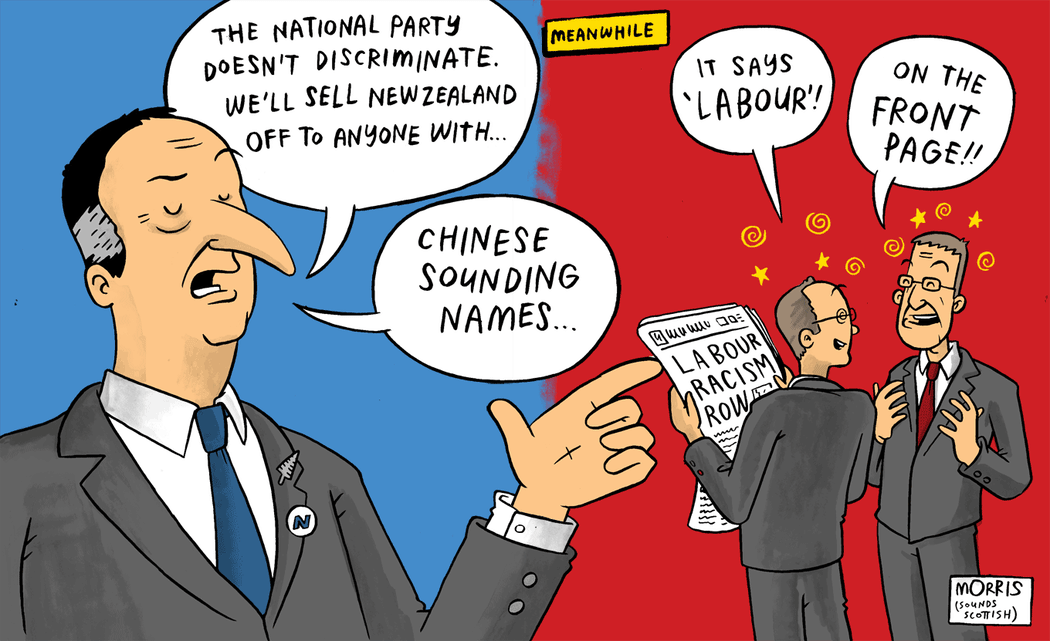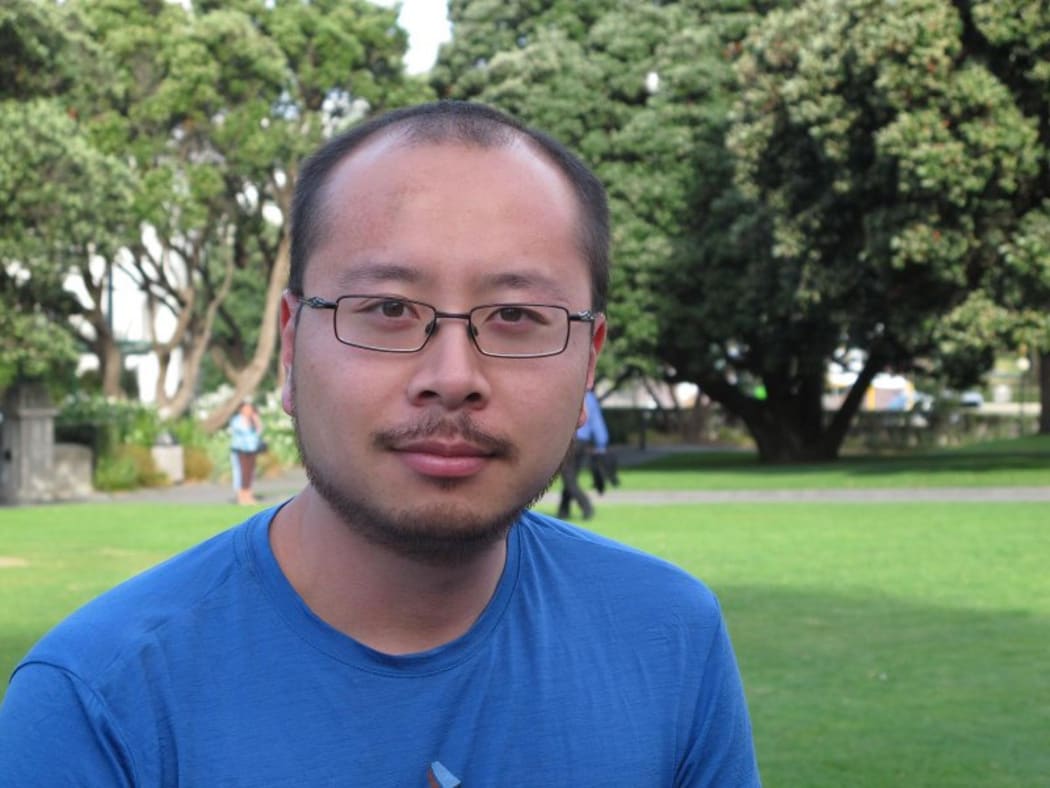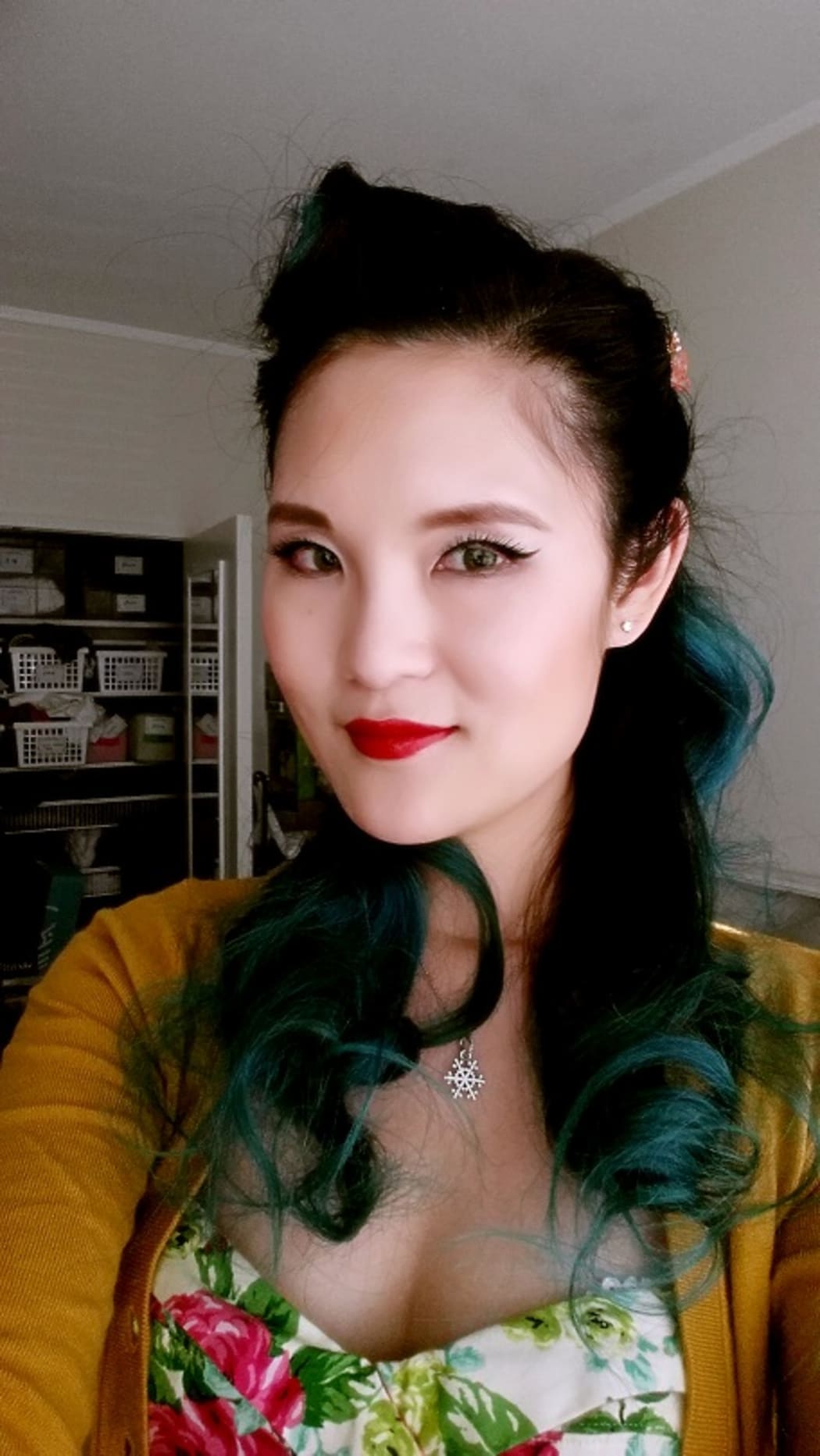
Photo: Illustration: Toby Morris.
Like a celebrity after one too many drinks, Auckland’s property market has had enough bad press to make a PR person shudder.
The cost of residential properties in the city has increased 10 times faster than the rest of country, currently sitting on an average asking price of $834,300.
The issue was given new life over the weekend after Labour Party housing spokesperson Phil Twyford pointed the finger at Chinese buyers for pushing up prices beyond the reach of “hard working Kiwis”.
MORE STORIES:
- A grain of truth: Racism exists in New Zealand
- Obama underscores race struggle with n-word
- Adding to the melting pot
Twyford claims data leaked to the Labour Party from a major property firm shows people with Chinese names bought nearly 40 percent of houses over a three-month period.
He says since resident Chinese only account for just nine per cent of Auckland’s population it’s proof that overseas Chinese buyers are driving the sky-rocketing property market in Auckland.
Labour was quickly accused of playing the race card and social media broke into a heated debate about whether it was an unfair stab at the Chinese community or just a cold hard look at the truth.
Twyford responded in an op-ed in the New Zealand Herald saying that however uncomfortable it is, the data backs up what many Aucklanders knew was going on.
“Many have welcomed what they see as a long overdue debate. Others, notably in the twittersphere, have been quick to accuse me of racism because I have talked about a particular ethnic group,” he wrote.
Thought long and hard about this story. It's not about having a go at Chinese NZers. Just look at the numbers. 1/2
— Phil Twyford (@PhilTwyford) July 10, 2015
But some aren't convinced.
Keith Ng, co-founder of ChewyData and self-proclaimed “data nerd”, was quick to the mark with his criticism of Labour’s claims.
Several hours after the story broke, Ng wrote a blogpost arguing that the figures weren't saying nearly as much as Twyford said they were.
“They have one piece of real data: ‘39.5% of last names in a list of house sales sound Chinese’. All the assertions that Labour are making beyond this are complete bullshit,” he wrote.
The data cannot make clear whether the buyers are investors, owner-occupiers, recent migrants or citizens of New Zealand, he said. “You can’t magically MATH your way from a last name to a residency status.”
Ng, who was born in Hong Kong and moved to New Zealand 25 years ago, told The Wireless when he first saw the data, he felt the debate was going to turn racist.
“It really reduces down this complex economic problem. None of the actual issues around foreign ownership have been discussed by Labour and they’ve turned it into a race debate.”

Keith Ng Photo: Supplied
While there are offshore Chinese buyers picking up houses in New Zealand, Ng says the actual numbers aren’t known and Labour’s data doesn’t help.
“If we want to actually address the problem of overseas buyers and their influence on the housing market, we can’t just go around making up numbers.”
Ng said aside for flawed analysis, the claims from Labour that a “tsunami" of Chinese money is making it hard for ordinary Kiwi families to own properties was hurtful.
“I consider myself to be part of the community of New Zealand. For me to be dragged into this debate, to be considered part of causing the housing crisis because my last name sounds Chinese, is a huge problem for me.”
“What it does is send the message that it’s somehow wrong for me to buy a house because I’m taking them away from hard-working Kiwi families. It reinforces the messages that we are not Kiwi families.”
When @nzlabour blames offshore Chinese for NZ's housing problem, it's Chinese New Zealanders who are harassed and treated with suspicion.
— Keith Nglish (@keith_ng) July 13, 2015
Personally, I think it is entirely possible to talk about the problematic impact of PRC money on the NZ economy without sounding racist.
— Tze Ming Mok (@tzemingdynasty) July 14, 2015
A 2010 Human Rights Commission report [PDF] found that one in two New Zealanders felt the recent arrival of Asian migrants was changing the country in undesirable ways.
The report also found that more than 23 per cent of Asian respondents had experienced discrimination in the past 12 months, a higher proportion than all other ethnic groups, including Māori and Pacific Island.
“When New Zealanders are asked to identify which group faces the most discrimination, Asians have been cited first year-after-year,” the report said.
Hong Kong-born Bevan Chuang said the blanket blaming of all Chinese for inflated house prices is damaging to the community.
“It’s uncomfortable scare-mongering that will cause more problems for the Chinese who have been living here for generations.”
Chuang moved to New Zealand 18 years ago and grew to notoriety after a highly-publicised affair with Auckland Major Len Brown.
She is well-known in Auckland’s Chinese community where she served as the chair of the Asian Women and Family Trust and became a member of Auckland Council's Ethnic Peoples Advisory Panel.

Bevan Chuang Photo: Supplied
In a post on her blog, Chuang shared some responses from the Chinese community including the results of a poll on Skykiwi—the biggest Chinese website in New Zealand.
The poll asked users if they believed Auckland house prices were being pushed up by Chinese buyers and 62 per cent of respondents said yes, 18 per cent said no, 18 per cent were unsure.
Chuang said there are companies dedicated to attracting Chinese investors to New Zealand, but there aren’t hard facts yet to back up how successful they are.
“You hear from people online saying ‘oh yeah, I saw a lot of Asians at an auction’. You can’t really tell what their immigration status is just by looking at their faces.”
Chuang said the feedback online has not been kind to the Chinese community and people complaining about Auckland turning into “another China” is causing tension.
“I’m from Hong Kong and I know a lot of people from my community are saying ‘no, we’re not from China’, trying to distance themsleves from the issue. There is that division and it’s not just Chinese versus non-Chinese–it’s even within the Chinese community.
“I don’t think Phil Twyford is trying to make it a racist discussion, but I think what he has done is generated racism among some people.”
Kiwese blog founder Kristen Ng wrote that while she doesn’t often weigh into politics, in this case she found it hard to restrain her frustration.
“Labour’s figures boil down to little more than an unsubstantiated set of figures that blame the Chinese for Auckland’s housing crisis based on a game of Charades, with Twyford heavy on the clue for ‘souuuuunds liiiiike…’”
She called it “just plain offensive”, noting that claims from Twyford that it’s not about race makes it seem like offended Chinese are being “too PC”.
“There have been emotive responses to Twyford’s comments from all sides of politics. Any issue that scapegoats a particular ethnic group will provoke emotion.”
Ng noted that this isn’t the first time the Chinese community have copped flack in New Zealand media, with headlines earlier this year about Chinese tourists’ car keys being confiscated by disgruntled locals.
“I’m worried about how the continuously negative, invasive portrayal of ethnic Chinese in the media by the highest levels of government will fall back on the way we are treated on the street, at an open home, online, or at school,” she wrote.
I have this awful feeling that next time I'm in Auckland, hard working Kiwis will hiss at me for being a shit driver/chronic house buyer.
— Kiwese (@kiwese) July 12, 2015
Since the issue is being touted as a “foreign buying” problem, Ng asks why race was brought into the equation at all, and why one specific group was targeted.
“Labour’s analysis rests on the presumption that people with Chinese names are simply non-resident foreign property speculators…It reinforces and relies upon the toxic monocultural hegemony that to be Kiwi, a real Kiwi, is to be white.”

